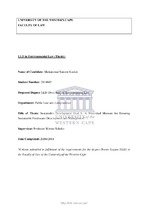| dc.description.abstract | Water is at the very core of sustainable development, critical for a thriving people, planet and prosperity. Water is regarded as a public good which is fundamental for health and life. Water is so important that it was debated as being a basic human right on many international platforms. Water access has plagued many parts of the world for a long period of time. In recent years, there have been increasingly urgent warnings of a global water crisis, as the human species consistently uses more water than is sustainably available. The international community tried to work towards overcoming these water-related issues by establishing the then Millennium Development Goals (hereafter referred to as MDGs), with MDG7.C focusing on access to safe drinking water. Even though MDG7.C was achieved in part, issues still remained regarding water access and quality. Sustainable Development Goal 6 (hereafter referred to as SDG 6) was then introduced and the scope of SDG6 is much wider than its predecessor, since the water access and scarcity problems are still prevalent today. The 2030 Agenda for Sustainable Development includes a dedicated goal on water and sanitation that sets out to ensure availability and sustainable management of water and sanitation for all. SDG6 expands the MDG focus on drinking water to now cover the entire water cycle, including the management of water, wastewater and ecosystem resources, with water at the very core of sustainable development. The goal has, in essence, extended to include a much broader spectrum of issues that need to be solved which, in essence, unravels even more challenges along the way. As a result, it is imperative to determine whether SDG6 can allow for actual sustainable development in terms of freshwater resources. Thus, this thesis will discuss the advent of the Sustainable Development Goals (hereafter referred to as SDGs), in particular SDG6, as well as analyse how SDG6 impacts on International Environmental Law, with particular emphasis on International Freshwater Law. The main aim of this research is to determine whether the creation and implementation of SDG6 can result in overall freshwater sustainability and whether this can result in the furtherance of sustainable development. | en_US |

